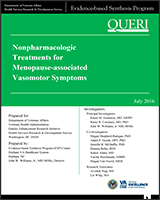NCBI Bookshelf. A service of the National Library of Medicine, National Institutes of Health.
Vasomotor symptoms (VMS), which include hot flashes and night sweats, are the most common symptoms reported during the menopausal transition and are experienced by as many as 80% of women. VMS can lead to increased healthcare encounters for symptom relief and reductions in quality of life. The degree to which VMS is bothersome is determined not only by how frequently it occurs but also by other factors such as duration of VMS, coexisting sleep problems, and the extent to which VMS interferes with daily activities or job-related activities. Hormone therapy (HT) is an effective treatment for reducing VMS, but use of this therapeutic approach must be individualized through weighing benefits with known risks, such as cardiovascular events or uterine and breast cancers. Based on age (> 45 years), currently half of the approximately 360,000 women Veterans who use Veterans Health Administration healthcare are perimenopausal or postmenopausal. Due in part to concerns about possible harms from long-term hormone therapy and in part to uncertain efficacy and safety of pharmacologic treatments, many women with VMS seek nonhormonal, nonpharmacologic treatment options.
Contents
Suggested citation:
Goldstein KM, Coeytaux RR, Williams Jr JW, Shepherd-Banigan M, Goode AP, McDuffie JR, Befus D, Adam S, Masilamani V, Van Noord MG. Nonpharmacologic Treatments for Menopause-Associated Vasomotor Symptoms. VA ESP Project #09-009; 2016.
This report is based on research conducted by the Evidence-based Synthesis Program (ESP) Center located at the Durham VA Medical Center, Durham, NC, funded by the Department of Veterans Affairs, Veterans Health Administration, Office of Research and Development, Quality Enhancement Research Initiative. The findings and conclusions in this document are those of the author(s) who are responsible for its contents; the findings and conclusions do not necessarily represent the views of the Department of Veterans Affairs or the United States government. Therefore, no statement in this article should be construed as an official position of the Department of Veterans Affairs. No investigators have any affiliations or financial involvement (eg, employment, consultancies, honoraria, stock ownership or options, expert testimony, grants or patents received or pending, or royalties) that conflict with material presented in the report.
- NLM CatalogRelated NLM Catalog Entries
- A large multinational study of vasomotor symptom prevalence, duration, and impact on quality of life in middle-aged women.[Menopause. 2011]A large multinational study of vasomotor symptom prevalence, duration, and impact on quality of life in middle-aged women.Blümel JE, Chedraui P, Baron G, Belzares E, Bencosme A, Calle A, Danckers L, Espinoza MT, Flores D, Gomez G, et al. Menopause. 2011 Jul; 18(7):778-85.
- Review Managing menopausal vasomotor symptoms in older women.[Maturitas. 2021]Review Managing menopausal vasomotor symptoms in older women.Stuenkel CA. Maturitas. 2021 Jan; 143:36-40. Epub 2020 Aug 26.
- Review Critical appraisal of paroxetine for the treatment of vasomotor symptoms.[Int J Womens Health. 2015]Review Critical appraisal of paroxetine for the treatment of vasomotor symptoms.Carroll DG, Lisenby KM, Carter TL. Int J Womens Health. 2015; 7:615-24. Epub 2015 Jun 18.
- Review Fezolinetant: A Potential Treatment for Moderate to Severe Vasomotor Symptoms of Menopause.[touchREV Endocrinol. 2023]Review Fezolinetant: A Potential Treatment for Moderate to Severe Vasomotor Symptoms of Menopause.DePree B. touchREV Endocrinol. 2023 Nov; 19(2):69-72. Epub 2023 Jun 15.
- Hot flushes and night sweats differ in associations with cardiovascular markers in healthy early postmenopausal women.[Menopause. 2012]Hot flushes and night sweats differ in associations with cardiovascular markers in healthy early postmenopausal women.Hitchcock CL, Elliott TG, Norman EG, Stajic V, Teede H, Prior JC. Menopause. 2012 Nov; 19(11):1208-14.
- Nonpharmacologic Treatments for Menopause-Associated Vasomotor SymptomsNonpharmacologic Treatments for Menopause-Associated Vasomotor Symptoms
Your browsing activity is empty.
Activity recording is turned off.
See more...
